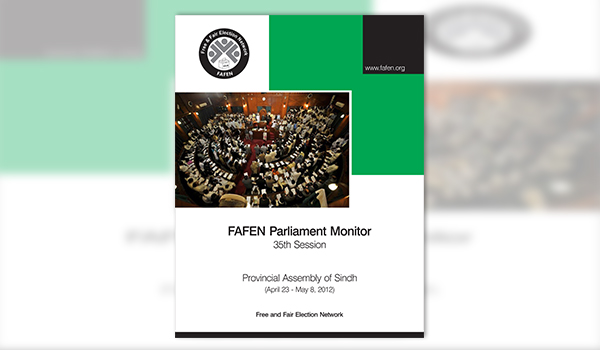Low attendance of Members, late starts, Points of Order interrupting regular proceedings and a brief discussion on law and order marked the Sindh Assembly’s 35th session.
Following the Supreme Court verdict in the contempt case, the House adopted a Resolution reposing confidence in the Prime Minister. A Resolution on the Bhoja Air plane crash, which resulted in loss of 127 lives, was also adopted. In all the Assembly adopted six Resolutions.
The session spanning 23 hours and 10 minutes comprised nine sittings between April 23 and May 8, on average meeting two hours and 34 minutes per sitting. Each sitting on average was delayed by 102 minutes. Though the law and order in the province, especially Karachi, was on the agenda, it was discussed only for an hour and 31 minutes constituting six percent of the total session time. Speaking for two hours in the last sitting, the Chief Minister presented a four-year performance report of the government, terming the law and order satisfactory in the province.
The Members’ seriousness in discharging their representative and legislative duties can be judged from their attendance. Since the Sindh Assembly Secretariat does not make the attendance record public, FAFEN conducts a headcount of Members at the beginning and end of each sitting and documents the actual time spent on the floor of the House by the Speaker, Deputy Speaker, and the Chief Minister. Currently the Sindh Assembly is without the Leader of the Opposition.
On average, only 29 Members were present at the outset and 57 at the end of each sitting.
The Chief Minister attended two sittings for 22% (222 minutes) of the session time. The Speaker chaired the proceedings for 77% of the session time; the Deputy Speaker 13% while the remaining 10% of the time was presided over by Members of Panel of Chairpersons. The parliamentary leader of MQM attended all nine sittings; those representing the PPPP, ANP and PML (F-B) (five each), PMLF (three), and NPP and PML leaders (one each).
Although the Quorum was visibly lacking at various stages of the session, it was not pointed out by any legislator. FAFEN documents the participation by observing the number of Members who submitted Agenda on the Orders of the Day, those who took part in debates on the floor of the House, and those who did both. Four percent Members of the House brought Agenda items on the Orders of the Day, 33% took part in debates and four% engaged in both.
Members belonging to the PMLF were most involved during this session as 50% participated in the proceedings, MQM followed with 47% Members, PPPP (36%) and PML (30%). Four NPP and one ANP Member also marked their participated either by submitting an Agenda item or taking part in debates.
Out of a total 29 female Members, 80% (24) Members took part in the session either by submitting Agenda, taking part in debates or both. While, 31% (42 out of 136) male Members took part in the proceedings.
Three treasury-backed bills – The Sindh Government Servants Benevolent Fund (Amendment) Bill 2012, the Sindh Teachers Education Development Authority Bill 2012 and the Colonization of Government Lands (Sindh Amendment) Bill 2011 – were passed. The sole Private Members’ Bill appearing on the Agenda – the Protection of Religious Minorities’ Properties Bill 2012 – was introduced and sent to the relevant Standing Committee.
Most of the Agenda for the Private Members’ Day was left unaddressed since it was ambitiously set and therefore unable to be completed in a single sitting. The Members raised 82 Points of Order which consumed almost one-fourth of the session time – 212 of the total 923 minutes. None of the Points of Order attracted the Chair’s formal ruling. Without the Chair’s formal ruling, these Points of Order do not lead to any output.
Forty-four out of 47 Starred questions (requiring oral replies) appearing on the Agenda were taken up by the House. On average five questions were asked per sitting. Additionally, a total of 155 Supplementary questions were asked.
For complete report click here









